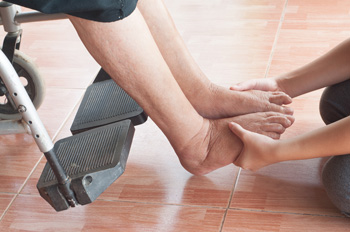Stuart (772) 223-8313Rate Us
Jupiter (561) 744-6683Rate Us
Stuart (772) 223-8313Rate Us
Jupiter (561) 744-6683Rate Us
If you have a stabbing pain on the bottom of your foot near the heel that is worse first thing in the morning when you get up, you may have plantar fasciitis. Plantar fasciitis is a very common cause of heel pain, occurring when the plantar fascia—a fibrous band of tissue on the sole of the foot that links the heel bone with the toes and supports the arch—becomes irritated, swollen, hot, red and sore. This irritation may occur through overuse of the plantar fascia due to sports activities, obesity, spending a good deal of your day standing, or by having high arches or flat feet. If you are experiencing the pain of plantar fasciitis, which may be worse in the morning or after periods of rest, there are various proven methods and therapies to treat it successfully. Don’t put up with the pain of plantar fasciitis. Instead, it’s a good idea to make an appointment with a podiatrist today to begin your journey to recovery.
Plantar fasciitis is a common foot condition that is often caused by a strain injury. If you are experiencing heel pain or symptoms of plantar fasciitis, contact one of our podiatrists from Advanced Foot & Ankle Specialists, PA. Our doctors can provide the care you need to keep you pain-free and on your feet.
What Is Plantar Fasciitis?
Plantar fasciitis is one of the most common causes of heel pain. The plantar fascia is a ligament that connects your heel to the front of your foot. When this ligament becomes inflamed, plantar fasciitis is the result. If you have plantar fasciitis you will have a stabbing pain that usually occurs with your first steps in the morning. As the day progresses and you walk around more, this pain will start to disappear, but it will return after long periods of standing or sitting.
What Causes Plantar Fasciitis?
There are some risk factors that may make you more likely to develop plantar fasciitis compared to others. The condition most commonly affects adults between the ages of 40 and 60. It also tends to affect people who are obese because the extra pounds result in extra stress being placed on the plantar fascia.
Prevention
There are a variety of treatment options available for plantar fasciitis along with the pain that accompanies it. Additionally, physical therapy is a very important component in the treatment process. It is important that you meet with your podiatrist to determine which treatment option is best for you.
If you have any questions, please feel free to contact one of our offices located in Stuart and Jupiter, FL . We offer the newest diagnostic and treatment technologies for all your foot care needs.
 Podiatrists are medical doctors who focus on treating issues with the lower legs, ankles and feet. They can do surgery, reset bones that are broken, and write prescriptions. Podiatrists are also helpful for diabetic patients because diabetes can prevent them from getting enough blood to the feet. Because of this, regular podiatrist visits can help to prevent severe issues and even amputation. Podiatrists can help patients with a variety of foot related issues, such as heel pain, warts, calluses, ingrown toenails, fungal nail infections, and even athlete’s foot. Podiatrists can also treat injuries to the foot and ankles, including sports injuries like sprains. Patients who have any issues with their feet would be wise to consult with a podiatrist for a proper diagnosis and treatment method.
Podiatrists are medical doctors who focus on treating issues with the lower legs, ankles and feet. They can do surgery, reset bones that are broken, and write prescriptions. Podiatrists are also helpful for diabetic patients because diabetes can prevent them from getting enough blood to the feet. Because of this, regular podiatrist visits can help to prevent severe issues and even amputation. Podiatrists can help patients with a variety of foot related issues, such as heel pain, warts, calluses, ingrown toenails, fungal nail infections, and even athlete’s foot. Podiatrists can also treat injuries to the foot and ankles, including sports injuries like sprains. Patients who have any issues with their feet would be wise to consult with a podiatrist for a proper diagnosis and treatment method.
If you are experiencing pain in the feet or ankles, don’t join the stubborn majority refusing treatment. Feel free to contact one of our podiatrists from Advanced Foot & Ankle Specialists, PA. Our doctors can provide the care you need to keep you pain-free and on your feet.
What Is a Podiatrist?
Someone would seek the care of a podiatrist if they have suffered a foot injury or have common foot ailments such as heal spurs, bunions, arch problems, deformities, ingrown toenails, corns, foot and ankle problems, etc.
Podiatric Treatment
A podiatrist will treat the problematic areas of the feet, ankle or lower leg by prescribing the following:
A common podiatric procedure a podiatrist will use is a scanner or force plate which will allow the podiatrist to know the designs of orthotics. Patients are then told to follow a series of tasks to complete the treatment. The computer will scan the foot a see which areas show weight distribution and pressure points. The podiatrist will read the analysis and then determine which treatment plans are available.
If you have any questions please feel free to contact one of our offices located in Stuart and Jupiter, FL . We offer the newest diagnostic and treatment technologies for all your foot and ankle needs.
 Feet are a complex collection of bones, joints, and ligaments that takes years to develop fully. Most babies are born with flat feet, but this improves in the first few years of growth, as their bones develop and their muscles get stronger. By around six years of age, arch development is generally normal. When babies are learning to walk, they often turn their toes inward (in-toeing) until the muscles and ligaments develop. This can come from the foot, lower leg or upper leg. Occasionally, toddlers turn their toes outward (out-toeing) when they walk and run. This usually resolves itself as their posture and balance mature. If your child complains of pain, if their in-toeing or out-toeing does not improve or worsens, or if the condition affects only one side of the body, it may be wise to seek the expertise of a podiatrist for a full exam and prognosis. Additionally, if your child limps, trips frequently, develops bunions or ingrown toenails, or has abnormally shaped toes, it is suggested that you see a podiatrist for further examination.
Feet are a complex collection of bones, joints, and ligaments that takes years to develop fully. Most babies are born with flat feet, but this improves in the first few years of growth, as their bones develop and their muscles get stronger. By around six years of age, arch development is generally normal. When babies are learning to walk, they often turn their toes inward (in-toeing) until the muscles and ligaments develop. This can come from the foot, lower leg or upper leg. Occasionally, toddlers turn their toes outward (out-toeing) when they walk and run. This usually resolves itself as their posture and balance mature. If your child complains of pain, if their in-toeing or out-toeing does not improve or worsens, or if the condition affects only one side of the body, it may be wise to seek the expertise of a podiatrist for a full exam and prognosis. Additionally, if your child limps, trips frequently, develops bunions or ingrown toenails, or has abnormally shaped toes, it is suggested that you see a podiatrist for further examination.
The health of a child’s feet is vital to their overall well-being. If you have any questions regarding foot health, contact one of our podiatrists of Advanced Foot & Ankle Specialists, PA. Our doctors can provide the care you need to keep you pain-free and on your feet.
Tips for Keeping Children's Feet Healthy
If you have any questions, please feel free to contact one of our offices located in Stuart and Jupiter, FL . We offer the newest diagnostic and treatment technologies for all your foot care needs.
 As one ages, it becomes harder to reach down to the toes and keep toenails trimmed properly. In some cases, just gripping the clippers is difficult, if not impossible. At the same time, toenail growth decreases with age, resulting in thicker nails that are more difficult to trim. One way to soften the thicker nails and make them easier to cut is by soaking the feet for about 10 minutes in warm water. Thoroughly dry the feet, and use a clipper to make small cuts straight across the nail to lessen the chance of an ingrown toenail. If your toenails have both hardened and become discolored, you may also have developed a fungal infection. Such a condition can worsen rapidly and become painful. For that reason, it would be wise to contact a podiatrist immediately, as fungal infections may take months to eliminate. It is also suggested that seniors make regular appointments with a podiatrist for proper foot-care treatment as needed.
As one ages, it becomes harder to reach down to the toes and keep toenails trimmed properly. In some cases, just gripping the clippers is difficult, if not impossible. At the same time, toenail growth decreases with age, resulting in thicker nails that are more difficult to trim. One way to soften the thicker nails and make them easier to cut is by soaking the feet for about 10 minutes in warm water. Thoroughly dry the feet, and use a clipper to make small cuts straight across the nail to lessen the chance of an ingrown toenail. If your toenails have both hardened and become discolored, you may also have developed a fungal infection. Such a condition can worsen rapidly and become painful. For that reason, it would be wise to contact a podiatrist immediately, as fungal infections may take months to eliminate. It is also suggested that seniors make regular appointments with a podiatrist for proper foot-care treatment as needed.
Proper foot care is something many older adults forget to consider. If you have any concerns about your feet and ankles, contact one of our podiatrists from Advanced Foot & Ankle Specialists, PA. Our doctors can provide the care you need to keep you pain-free and on your feet.
The Elderly and Their Feet
As we age we start to notice many changes in our body, but the elder population may not notice them right away. Medical conditions may prevent the elderly to take notice of their foot health right away. Poor vision is a lead contributor to not taking action for the elderly.
Common Conditions
Susceptible Infections
Diabetes and poor circulation can cause general loss of sensitivity over the years, turning a simple cut into a serious issue.
If you have any questions please feel free to contact one of our offices located in Stuart and Jupiter, FL . We offer the newest diagnostic and treatment technologies for all your foot and ankle needs.